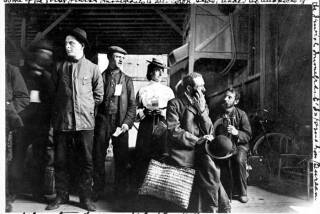Book Review : A Close Study of Characters in Transit
In Transit: 20 Stories by Mavis Gallant (Random House: $17.95; 229 pages)
First published in the New Yorker during the 1950s and â60s, these vintage stories have aged like fine Burgundy. A Canadian who settled long ago in Paris, Gallant is ideally placed to record the joys and tribulations of people permanently or temporarily at odds with their environment. Though the collection is conveniently divided into three sections, virtually all the characters are observed at the crucial moments when their lives irrevocably change; a thematic connection that gives the book a subtle unity.
In âThe Wedding Ring,â a barely adolescent girl is spending a summer in Vermont with her mother, a boy cousin âthe only American relation my age,â and an unnamed 24 year-old male guest. The narratorâs father is in Montreal attending to business, and this mysterious guest seems to have replaced him in some obscure way; driving the family to the movies, tactfully disciplining the children, turning the writerâs mother into a capricious stranger. Sometimes she talks about her daughter to the visitor as âif sheâd never seen me beforeâ; other times, she treats her as a contemporary.
Young as she is, the child derives the truth from these contrary messages, realizing her mother is in love with the visitor. At the beginning of this brief piece, sheâs still a child; a few acute perceptions later, sheâs become an adult.
Awaiting Other Assignments
âMalcolm and Beaâ transports us to a NATO enclave in France, where Americans, Canadians and Britons are winding up their tours of duty and awaiting other assignments. All the themes of âIn Transitâ coalesce in this one particular story, nuanced with Gallantâs shrewd eye for the subtle differences of speech, dress, and manner that define national character and separate people from each other. A single phrase about the way children play âwithout admonitions and good adviceâ under the disapproving eye of the old French âgardienâ tells you exactly how these interlopers are regarded in their host country.
Malcolm is English, Bea Canadian, and the tensions of their French sojourn have frayed their marriage to the point where Malcolm asks his wife whom she hates most, the English, the French, or the Americans, knowing the unspoken answer will be Malcolm himself, for bringing her to a place that could never be home. Bea may not be quite as hopelessly provincial as Verna Baum, who has gone from the Congo to Copenhagen carrying âan electric iron that cannot be plugged in anywhere except Hamilton, Ontario,â but Gallant offers enough of Beaâs background to convince us sheâll never be a cosmopolite. Here again the characters are in transit emotionally as well as geographically; physical displacement intensifying their misery.
A Macho Festival
In âThe Hunterâs Waking Thoughts,â a Frenchwoman invites her scholarly and somewhat effete English lover to a hunting party at her fatherâs estate, a macho festival also attended by her husband. Colin Graves is put into an outbuilding with a cot, a lamp, and a chamber pot; relegated to the company of women and children while the men rampage around the estate, shooting everything that moves. Alone after his paramour leaves for Paris with her daughters and a still-bleeding hare, the frustrated lover realizes that the entire appeal of this cross-cultural romance has been its utter impossibility.
âIn Italyâ is a briskly ironic story exposing the ambivalent feelings of a young woman who inadvertently finds herself with a grandchild exactly the same age as her own infant son. Brought up to believe that sheâd be happier as an old manâs darling than a young manâs slave, Stella has wound up neither adored nor adoring, just patiently enduring the fatuities of the man she married. This time the transition is the crucial one between naivete and worldliness; a passage Stella will never quite manage.
Loyal to her husband, sheâs a true English brick, stuck indefinitely in a rented Italian villa where rats jump from tree to tree and every one of her English plants shrivels and dies in the alien soil. At least Peggy, Henry Manningâs disinherited daughter, can go home to England with her husband and baby, but Stella has made a choice and believes âyou have to stick to it, thatâs all.â There are a lot of Stellas in the world and their stories lend themselves perfectly to Gallantâs wit and compassion.
More to Read
Sign up for our Book Club newsletter
Get the latest news, events and more from the Los Angeles Times Book Club, and help us get L.A. reading and talking.
You may occasionally receive promotional content from the Los Angeles Times.








